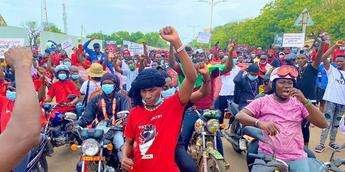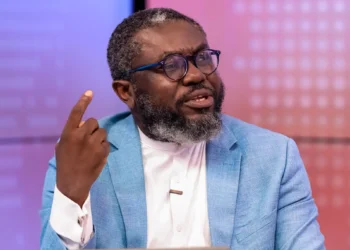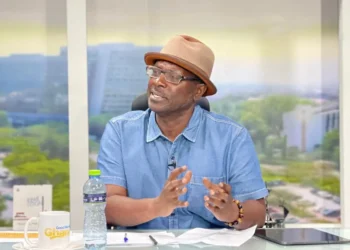Recently, some civil society leaders and members in Ghana have praised Kenyan youth following their successful protests against their government over the imposition of several burdensome taxes.
These demonstrations according to many of them showcased the power of a united youth voice in demanding accountability and transparency from political leaders.
Comparing Ghana’s current economic hardships, several of these civil society leaders and activists have urged Ghanaian youth to draw inspiration from their Kenyan counterparts and take a stand against the systemic issues plaguing the country.
Selorm Branttie, Vice President of the IMANI Centre for Policy and Education, wading into the conversation passionately urged Ghanaian youth to rise and demand accountability from their leaders amidst growing economic despondency.
His heartfelt message underscores the urgent need for active civic engagement to address the dire economic situation and systemic corruption that threatens the future of Ghana.
Mr Branttie’s statement painted a vivid picture of the struggles faced by many Ghanaians today. He recounted a story of a young woman, and a recent graduate, whose excitement for the future quickly turned to despair after her father, now retired, informed her that he could no longer support her financially.
“Her father just went on pension, but his purchasing power has reduced because the actual value of his salary has halved within the last two years. His investments carefully made for his twilight years have also received a haircut thanks to Ken Ofori-Atta’s Databank and inglorious policies.
“So have his treasury bills. What the old man has is enough to keep his house bills and pay his increasing medical bills and medications, which are increasing monthly due to the dollar”.
Selorm Branttie, Vice President of IMANI Centre for Policy and Education
This situation, according to him is a reflection of the broader economic challenges faced by many families in the country.
Government’s Economic Mismanagement
Furthermore, Mr Branttie strongly posited that the country’s economic challenges are compounded by the government’s financial mismanagement and the lack of opportunities for young people.
He pointed out that even though Ghana’s population has doubled since he finished secondary school in 1996, job opportunities have not kept pace.
According to him, the private sector, the engine of the country’s economic growth struggles to absorb the growing number of graduates, and small businesses face significant hurdles in accessing capital, with exorbitant interest rates and inflationary pressures stifling growth.
“Today, it is difficult for most people to even meet the requirements for expanding small businesses because there is very little capital support.
“Heck, even if I could successfully apply for a loan to push my business, I would have to pay around 38% interest, on top of VAT, on top of inflation, on top of dollar depreciation, on top of imported dollar inflation. At this rate, when will I even be able to pay back? That oneself you no go get”.
Selorm Branttie, Vice President of IMANI Centre for Policy and Education
He also highlighted the tone-deafness of the current government, which has imposed heavy tax burdens on citizens while failing to address the root causes of the economic crisis.
Mr Branttie pointed out that instead of reducing these burdens, the Vice President, Dr Mahamudu Bawumia, the flagbearer of the ruling party has rather promised future relief only if he is elected as President, effectively shirking responsibility for the current plight of Ghanaians.

Systemic Corruption Impact Ghana’s Economy
Moreover, the Vice President of the policy think-tank, IMANI Centre for Policy and Education, Selorm Branttie underscored the destructive impact of systemic corruption on the country’s economy.
He indicated that the siphoning of public funds by high-ranking officials depletes the capital needed to stimulate economic growth, pushing more people into poverty.
This, according to him creates a vicious cycle where the few employed individuals must support an increasing number of dependents, leaving little room for savings and investment.
“In so doing we have created a society with such a warped sense of morality and patronage that we have glorified graft and we literally have gangsters and hoodlums walking in the corridors of power and strutting the plumes of their newly minted helmets of arrogance in our faces.
“They willingly break laws, plunder our environment, sell our resources to the highest bidder and pocket the returns with the token given to the elite collective to keep the well-oiled patronage machine moving at high speed and efficiency”.
Selorm Branttie, Vice President of IMANI Centre for Policy and Education
Ghanaian Youth Urged to Take Action in Politics
In a stirring call to action, Mr. Selorm Branttie warned Ghana’s youth about the dangers of political apathy.
Highlighting the growing detachment among the younger generation, Mr Branttie emphasized that this lack of interest enables elected representatives to act without accountability, ultimately making life unbearable for the populace.
Mr Branttie passionately urged the youth to harness their potential and actively participate in shaping the country’s future.
“WALAHI, the youth can rescue Ghana if they decide to flex their muscles. YOUTH OF GHANA, please learn from others and flex your muscles, or else you will inherit broken dreams and pain. All your toil will mean nothing and you will be left with dreaming of foreign passports when the foreigners can come and pick what they like and go.
“Build your voice so the nation accounts to you. You are the future of Ghana. The people destroying the country will leave the mess for you to clean up. Nobody else will do it if you don’t care”.
Selorm Branttie, Vice President of IMANI Centre for Policy and Education
Mr. Branttie’s remarks are a poignant reminder of the critical role the youth can play in ensuring a prosperous and accountable future for Ghana.
As Mr Branttie poignantly noted, the longer the youth remain disengaged, the more the country’s leaders will disregard their responsibilities.
The youth of Ghana must therefore rise and demand accountability from political leaders, bearing in mind apathy and detachment of the younger generation only embolden corrupt officials to continue their exploitative practices unchecked.
The consequences of inaction are severe, with a future marked by broken dreams and unfulfilled potential.
READ ALSO: GSE Sees Bullish Surge as 5 Top Stocks Gain Momentum























